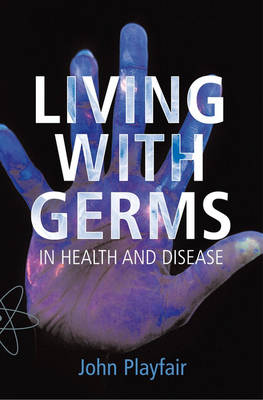John Playfair’s short book Living with Germs: In Health and Disease takes the reader through the essentials of infectious organisms - bacteria, viruses, protozoa and the rest - and of our defences against them, the immune system with its powerful weapons and occasionally dangerous side effects. The alternatives - antibiotics and public health measures - are also considered and there is a look ahead at some of the significant problems to come in the future. In the post below, John Playfair reminds us that infectious diseases don’t stand still for long.
The death of two sumo wrestlers last year from a new strain of herpes gladiatorum (’scrumpox’ to rugby players) is not only bad news for Japan’s number one sport but a reminder that infectious diseases do not stand still for long.
 MRSA, drug-resistant tuberculosis, malaria, and the permanently shifting AIDS viruses have been for years at the very top of the list of world health problems, and now a new hybrid flu virus from pigs, containing additional genes from both avian and human strains has unexpectedly leapfrogged all these to potential pandemic status (WHO threat level 5). With global warming already introducing ‘tropical’ insect-borne diseases such as malaria, leishmaniasis, and dengue to temperate zones such as Europe and North America, and with vaccines still lacking for all fungal, protozoal, and worm infections, it is no longer thinkable to say, as the US Surgeon-General rashly did 40 years ago, that ‘it is time to close the book on infectious diseases.’
MRSA, drug-resistant tuberculosis, malaria, and the permanently shifting AIDS viruses have been for years at the very top of the list of world health problems, and now a new hybrid flu virus from pigs, containing additional genes from both avian and human strains has unexpectedly leapfrogged all these to potential pandemic status (WHO threat level 5). With global warming already introducing ‘tropical’ insect-borne diseases such as malaria, leishmaniasis, and dengue to temperate zones such as Europe and North America, and with vaccines still lacking for all fungal, protozoal, and worm infections, it is no longer thinkable to say, as the US Surgeon-General rashly did 40 years ago, that ‘it is time to close the book on infectious diseases.’
Three problems stand out. Drugs - loosely known as ‘antibiotics’ - have been very successful against some bacterial infections but much less so against viruses, where years of expensive research have been needed to identify those few weak spots where a drug can damage the virus but not its host (bacteria have far more of these). Vaccines, on the contrary, have a better record against viruses than against bacteria, and if any more infections are to follow smallpox into oblivion they will probably be viral - polio and the common childhood viruses being the most likely candidates. There remains the stumbling block of the immune system, our main protection against infection and the point at which successful vaccines operate. Almost a century ago it was discovered that with ‘toxic’ diseases like diphtheria and tetanus, all you needed for protection was a sufficient level of antibody in the blood.
But unfortunately this is not true of many infections: antibody may be ineffective, or directed at the wrong target, or actually harmful. Sometimes immune cells must go into action, killing viruses or releasing messenger molecules known as cytokines. But even cytokines can be dangerous; in fact they may account for the curious fact that swine flu appears to be more deadly in younger victims with active immune systems. So we must be prepared for more surprises.


